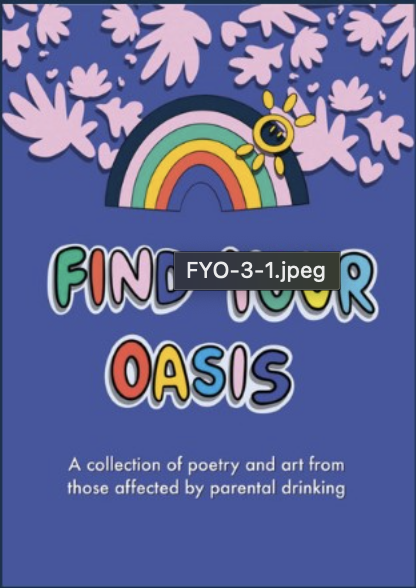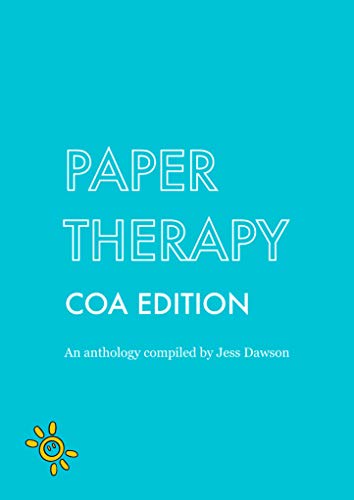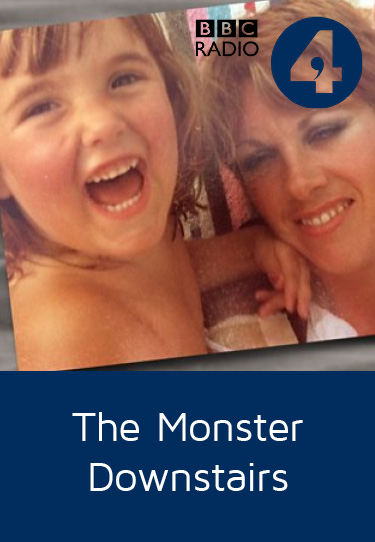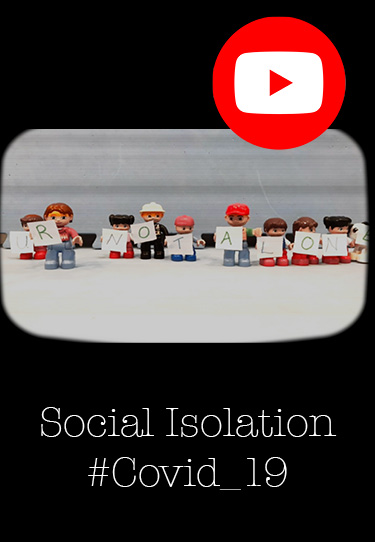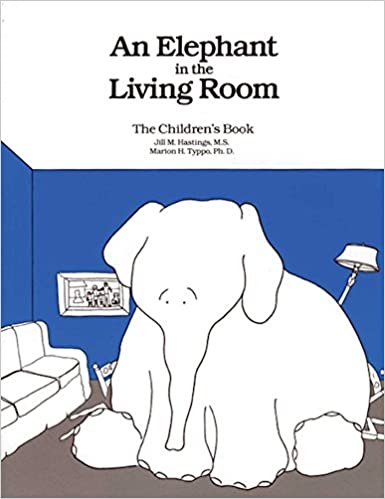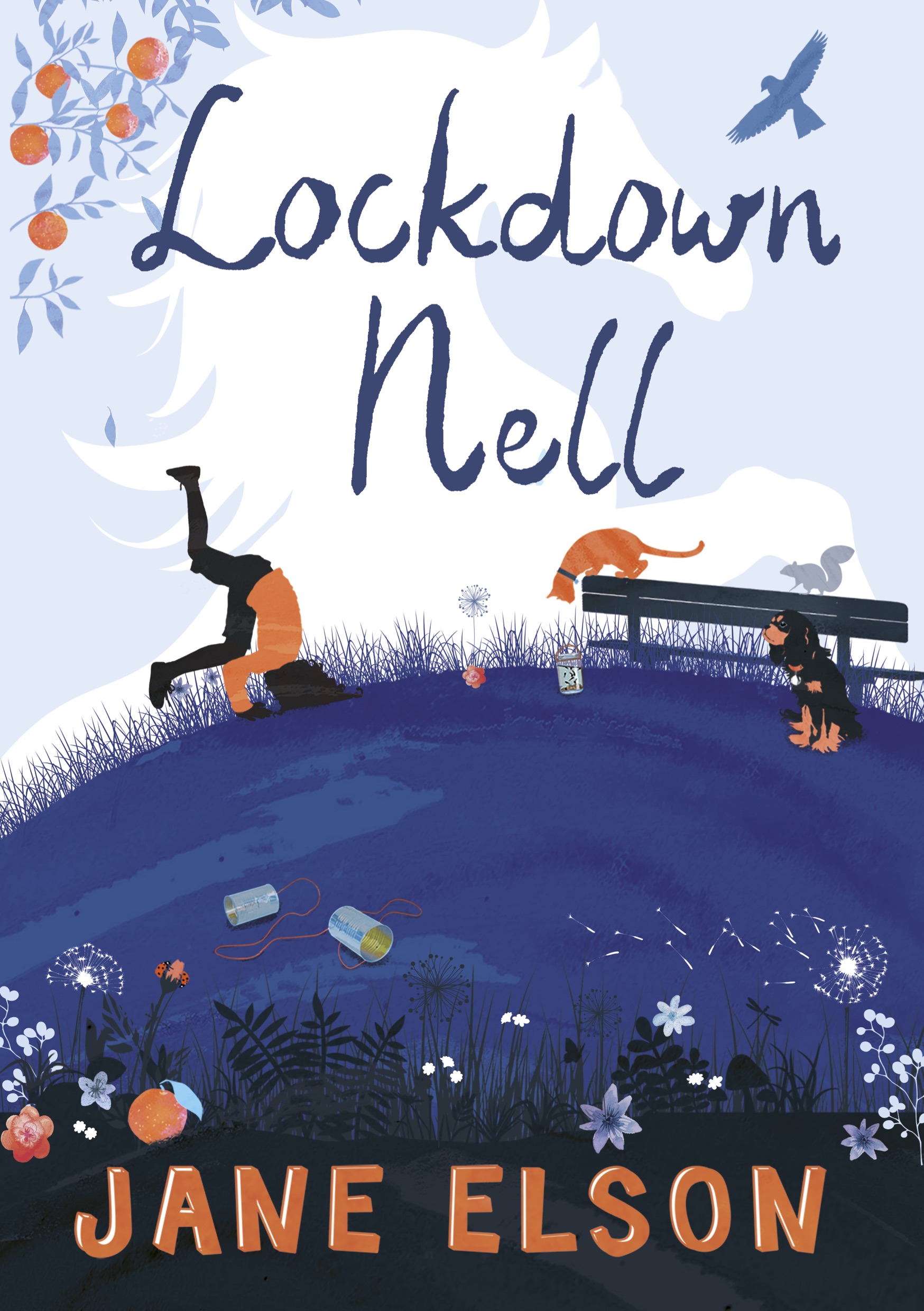FAQs
Below are some questions young people often have about alcohol problems and how parents’ drinking affects families.
If you have a question that isn’t listed, please ask us. For questions about contacting Nacoa, see Helpline FAQs.
Why do people drink alcohol (even when it makes them ill, cry, angry, do silly things)?
People have drunk alcoholic drinks for thousands of years. There are many reasons people drink:
- Some people like the taste
- They may drink at parties and other social events, often with family and friends.
- Others drink to ‘fit in’ or through peer pressure.
- Some people like how it makes them feel or drink to get drunk and ‘out of it’.
- Sometimes people use alcohol to unwind or to try to cope with problems such as job, money or relationship worries or bereavement.
Alcohol is a drug containing ethanol made from fermenting fruit or grains. Drinking alcohol affects the brain and nervous system, altering people’s mood and behaviour. Although alcohol is a depressant, at low doses it can initially have some stimulant effects—increasing people’s heart rate, making them feel happy and more confident, reducing anxiety, and for some people, increasing aggression.
Sometimes people do not realise how much they have drunk and end up intoxicated without intending to. Alcohol can cause memory blackouts—people don’t always remember silly, embarrassing or other things they have done when drinking.
People continue to drink because the positive feelings they experience outweigh any negative effects, such as being sick or getting a hangover.
To learn more about alcohol, see Drug Science.

When does someone have a problem with drink? Is my parent an alcoholic?
If you feel affected by someone else’s drinking, there could be a problem. The questions below look more at alcohol problems and why people continue to drink even when it’s affecting their lives and the people around them. You may also find it helpful to look at our Other Person Diagnosis sheet.
Remember that Nacoa is here for everyone affected by their parent, step-parent, grandparent, or carer’s drinking. We focus on the impact on you, whether they’ve been diagnosed as having a problem or not.
What is alcoholism?
When people regularly drink too much, they can develop an alcohol problem or addiction, often referred to as alcoholism. The medical term for this is an alcohol use disorder.
Alcohol problems are like an illness where people have lost control over their drinking. They may only mean to have one or two drinks and end up drinking more. Nobody sets out to have an alcohol problem. They often start drinking for fun and end up drinking to feel ‘normal’.
They spend more time drinking, thinking about drinking, and recovering from drinking and have often had unsuccessful attempts to stop or cut down.
People can become physically dependent on alcohol, needing to drink to get rid of unpleasant withdrawal symptoms. They usually need help to tackle the problem. It can be dangerous to stop drinking suddenly.
How does my mum/dad manage to drink all day every day?
People’s bodies build up tolerance to alcohol so they need to drink more to get the same effect.
When they’ve not had a drink, they experience withdrawal symptoms and can get anxious, shaky and sweaty. Sometimes they can have a seizure (fit), where their whole body shakes, and they may go unconscious.
Drinking alcohol can make these feelings stop. This can lead to a vicious cycle where people become physically dependent on alcohol and need to drink in order to feel ‘normal’.
What is denial?
Denial often goes hand in hand with addiction and is not the same as lying. The drinker believes that alcohol is the solution to problems, something that helps them function in everyday life. They may blame other people for their drinking and find ways to excuse their behaviour.
Denial can spread into other areas of life as a way of coping and hiding problems. Sometimes family members can also be in denial as a way of coping, pretending the problem doesn’t exist or keeping it hidden from the outside world.
Can drinking too much be harmful?
Too much alcohol can harm the body and brain. Drinking alcohol can:
- cause accidents and injuries
- lead to health problems such as liver disease, heart disease, some cancers, and diabetes
- weaken our immune system, making it harder for our bodies to fight off common illnesses and infections
- affect our mental health and lead to problems such as depression, anxiety and suicidal thoughts
Why does my parent continue to drink when they know the harm it is causing?
When someone has an alcohol problem, they continue to drink even when it is having a negative effect on their lives, their health, and those around them. Drinking can end up taking priority over everything, even those they love. It can lead to health, financial and relationship problems.
Often the person drinking doesn’t realise they have a problem. Even if they become aware something is wrong, they may not think it has anything to do with their drinking. They see drinking as the solution to problems and excuse or justify their behaviour. They may blame other people or other problems in their life.
Whatever anyone says, you are not responsible for your parent’s drinking, and it’s not your fault.
It’s painful to acknowledge when our behaviour hurts others, and it’s the same for people with drinking problems. If the drinker does notice the effect it is having on their family, they may drink more to cope with the guilt and shame.
It is hard for young people to see their parents keep drinking when it’s hurting them and everyone around them. It’s OK to love your parent whilst hating their drinking and how it affects their behaviour.
How can I stay safe?
When people drink, they can act differently and hurt themselves and the people around them. Talk to Nacoa and we can help you make a plan just in case you get scared.
- Think about where you feel safe. Some people feel safe in their bedroom, or with siblings or people they trust, like a friend, grandparent or neighbour.
- Make lists of places you feel safe and people you trust (including their telephone numbers or make sure they’re saved in your phone) so you have everything you need to keep safe and separate from the problems at home.
- If you are frightened, contact Nacoa and we can help you find a safe place, or phone ChildLine on 0800 1111. The Police and Ambulance Service are also here to help and want you to be safe – call 999.
Even if you have other people – like Social Workers – in your life you can continue to contact Nacoa.
My parent has a drink problem. Are they going to die?
Drinking too much can be harmful and sometimes fatal. Knowing someone is drinking heavily can be worrying.
The idea of a parent dying is scary for everyone, and when alcohol is involved, it can bring up a range of difficult feelings.
You might feel sad, angry, scared, embarrassed, irritable, lonely or numb. Sometimes people feel it would be better if their parent did die as it would end their suffering, but then feel guilty for having these thoughts.
When the family is unable to talk openly about issues, it can make it harder for them to support each other at difficult times. The death of a parent with alcohol problems may also create tension for the rest of the family.
If your parent has died, you may find it helpful to talk to Nacoa and to read our Coping with the Death of a Parent booklet.
Why do people become alcoholics?
Alcohol problems can affect people of all ages and from all walks of life. People don’t set out to have a drink problem. They often start drinking for fun or to try to cope with problems in their lives. They end up losing control over their drinking and needing alcohol to feel ‘normal’.
Many studies have looked at why some people become dependent on alcohol whilst others don’t. There seems to be a variety of factors that play a part – including genes, how people react to problems, learned behaviour, changes in the brain and more.
Is there a cure for alcoholism?
Alcohol problems are treatable – people can find help for their drinking and go on to live healthy lives.
For some people, this is possible by not drinking alcohol at all. This is often referred to as ‘being in recovery’. Many do this with the help of self-help groups, such as Alcoholics Anonymous.
Some people need medical help and go into treatment or rehab, where their physical and psychological dependence is addressed over weeks, months and sometimes years. Some rehab centres offer a residential programme, followed by supported living before returning to the family. Others offer daily programmes where patients continue to live at home.
Funding for treatment is sometimes available from the local authority following a referral by the GP. Other treatment programmes have to be paid for by the individual. Nacoa will happily research support options to give you an idea of what might be available for your parent(s).
Why can’t our doctor do anything about it?
Doctors can offer advice and suggestions, but the person drinking has to accept that they have a problem and want help. Help is available but no one can be forced to accept it.
This may be difficult for family members to accept, but talking to the doctor can still be helpful to find support for you. For information on where people can get help for their drinking when they are ready and willing, see Help for People with Alcohol Problems.

Should I hide, pour away or water down their alcohol?
You can’t control someone else’s drinking. Hiding, pouring away or watering down alcohol may make things worse, and the person drinking may become angry, aggressive or secretive.
How can I stop my parent from drinking?
You can’t stop anyone from drinking. There is help for people with drink problems, but they have to accept that they have a problem and want help.
Look after yourself and try to avoid getting into an argument when they are drinking. Remember that their drinking is not your fault. You can feel better whether your parent continues to drink or not. Try talking to someone you trust, like a friend, teacher, relative, or Nacoa.
What can I do to help my parent?
Spend some time finding out about alcohol problems. You don’t need to be an expert, but having an understanding can help you feel more prepared.
You could also find out about support available for people with alcohol problems so that if your parent wants to stop drinking, you have some information ready. Remember, it is not your responsibility to make them stop or find help, but it can be comforting to know what’s available. Nacoa will happily research this for you.
What else can I do?
To be there for other people, we must look after ourselves. You are important too.
Find time for things you enjoy, whether it’s sport or hobbies, going for a walk, reading a book, watching TV or gaming, hanging out with a pet, or meeting up with friends. Perhaps join an after-school, youth or sports club. Sometimes worries can take over, and taking a break can help.
Get support for yourself: talk to a friend, relative or teacher you trust or contact the Nacoa helpline. You cannot change your parent’s behaviour, but you can change how you feel about yourself.
It can sometimes help if the person drinking sees the consequences of their behaviour, so consider not covering up or clearing up for them. This can also be less exhausting for you. You are not responsible for someone else’s behaviour.
How can I broach the topic of my parent’s drinking?
Try talking when they are least likely to have been drinking and you are in a safe place. Try not to judge them, and remember to focus on how you are feeling, rather than their actions.
Please don’t expect too much, and remember how powerful denial can be; the person drinking often believes alcohol is the solution to problems and does not see their drinking as problematic. For suggestions, see Talking to Someone About Their Drinking.
How many people are affected by their parents’ drinking?
Research suggests that 1 in 5 children in the UK are currently living with parents who drink hazardously. You can be affected by your parent’s problems even if you are not living in the same house or if they no longer drink. Painful memories do not just disappear and the problem and its effects can continue into adulthood.
How does a parent’s drinking affect the family?
Alcohol problems do not only affect the person drinking but also everyone around them, including family and friends.
As the person drinking organises their life around alcohol, the family also focuses on the drinking; this can leave other family members, particularly children, feeling unimportant and confused.
Alcohol problems can lead to other issues. Sometimes there are money problems, parents can argue a lot, or there can be violence and mood swings. Life can be chaotic. What’s OK one day may not be OK the next. You may feel upset, scared, worried, lonely, confused, forgotten, ignored, embarrassed, guilty or ashamed.
Children of alcoholics are more likely to suffer from low self-esteem, depression and thoughts of suicide, and sometimes use drink, drugs and addictive behaviours, such as eating disorders, to cope. Despite this, many grow up to lead happy and healthy lives. Awareness of the problem and feeling supported can make a huge difference.
Remember, none of this is your fault. You can talk to us at Nacoa.
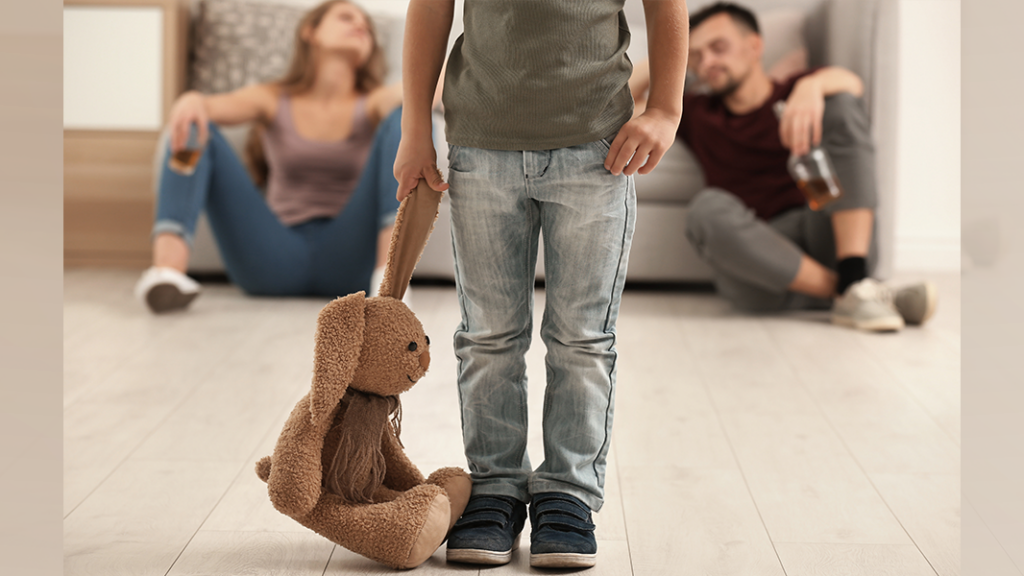
My parent has a drink problem. Does that mean I will too?
Nacoa’s research study suggests that people who grew up with parental alcoholism are almost three times as likely to develop a problem with alcohol compared to the general population.
People who grew up with parental alcohol problems often report an uneasy relationship with alcohol. Some people decide not to drink alcohol at all, whilst others choose to drink socially.
Many people worry they will end up drinking problematically like their parents, but being aware of the risks, looking after yourself and learning healthy ways of coping can help. Talk about your worries to someone you trust or contact the Nacoa helpline.
What is Fetal Alcohol Spectrum Disorder (FASD)?
Drinking alcohol during pregnancy can affect the baby’s development and cause Fetal alcohol spectrum disorder (FASD), leading to lifelong mental and physical challenges. For more information and support, see Me and My FASD.
Why doesn’t my mum or dad love me enough to stop drinking?
When people become dependent on alcohol, they often see drinking as the solution to their problems, and need alcohol to cope with everyday life. Alcohol becomes their main focus.
Alcohol problems are not about a lack of love. The need to drink becomes so important that they may hurt and upset those they care about. Young people sometimes feel to blame for their parent’s drinking or think they have in some way caused it.
Whatever anyone says, you are not responsible for your parent’s drinking. It’s not your fault.
Why has this happened to me? Have I done something to deserve it? Is it my fault?
You do not deserve it, and it isn’t your fault. Alcohol problems affect people of all ages and all walks of life.
There are many research studies which look at the reason why some people become dependent on alcohol whilst others don’t. Several factors play a part – a history of alcohol problems in the family, how we deal with life’s challenges, changes in brain function and more. However, there is no definitive reason why people drink, and there is no reason why this has happened to you.
Young people sometimes feel guilty and ashamed that they’ve not been able to help their parent stop drinking, feeling in some way that they have caused it.
Please be assured that someone else’s drinking is not your fault. You did not cause it, and you can’t control it. Parents sometimes blame children, and everyone else, for their drinking.
You did not make the problem start, and you can’t make it stop. Only your parent(s) can take responsibility for their behaviour, but you can look after yourself.
Why doesn’t anyone talk about it?
When someone has a drink problem, families often keep it a secret and try to hide it from the outside world.
The family rules don’t talk, don’t trust, don’t feel keep problems hidden in an effort to keep the family together and ‘safe’. These family rules develop because parents do not know how to resolve problems in any way other than to ignore them.
‘The elephant in the room’ has become a common description for something that people know is there but avoid talking about. Not all members of the family are as able as others to ignore or deny the problems. However, speaking out can sometimes feel like a betrayal or lead to isolation within the family. Some young people may be more aware of what’s happening but seek to look after themselves by distancing themselves from family life.
Talking about someone’s drinking can feel like you are telling on your family. It is OK to talk to someone you trust. You can always talk to us at Nacoa.

Why doesn’t anyone help me or notice what is going on?
Families often want to keep problems to themselves. They may adopt ‘a conspiracy of silence’ and not talk about what’s happening. This makes it difficult for other people to offer support or even realise there is a problem, especially when drinking is done secretly and parents work together to maintain the family image.
If people do notice, they may not know what to say or do. Others may approach the subject but are met with silence or denial. As alcohol problems often run in families, everyone in the social circle may consider drinking too much ‘normal’.
Although problems with alcohol are becoming more widely acknowledged, they are generally not well understood. People with no personal experience may not understand how the whole family is affected and think it would be too difficult a subject to approach and should be left to an expert; they may fear getting the parents into trouble or splitting up the family.
When no one speaks up or offers help, young people often feel alone and think they are the only ones going through this. This can make you feel unnoticed and unimportant. Or like you are going crazy or are the problem because no one else seems to see what’s going on.
You can talk to Nacoa’s volunteer helpline counsellors who understand the problem and who you can trust. You are not alone.
How can I cope with an alcoholic parent?
Try to find someone you can talk to who understands the problem. This could be a family member, teacher, counsellor, or organisation like Nacoa. Talking about how you feel is not being disloyal to your family and can help you feel less alone.
Sometimes people think they are to blame for their parent’s drinking and feel guilty and ashamed. Sharing your thoughts and feelings can help you understand that it is not your fault and help you feel better.
Do things you enjoy that take you out of the situation for a while. Having a parent who drinks too much can be stressful, so looking after you is important. There are people and places that can help. For ideas, see Help and advice.
What can I do to help my brothers and sisters?
Help them find someone to talk to who understands the problem. Tell them about this website. They can also speak to us at Nacoa if they want to.
They may think talking about family problems is being disloyal. Let them know it is OK to talk, and it’s none of yours fault.
Doing things and spending time together can help you forget the problems for a while. See Help & advice for ideas on how you can all feel better.
At Nacoa, we will happily look for support near where you live (you don’t have to give us your full address). There are people and places that can help.
How can I cope if other people criticise my parent(s)?
Although problems with alcohol are becoming more widely acknowledged, alcoholism and addiction are generally not well understood. People are sometimes quick to judge, especially when they have no first-hand knowledge of how the whole family is affected or why your parent can’t ‘just stop’.
It is not your job to fight your parents’ battles even though it may be hard for you not to defend them. If the person is important to you, direct them to this website or have information – perhaps a Nacoa leaflet – available. Although you may not have spoken to anyone before, you can talk to one of our volunteer helpline counsellors who understand the problem and who you can trust. Today you are not alone – we can help you to cope.
What can I do to feel better?
Look after yourself. Remember you can’t control someone else’s drinking and you certainly didn’t cause it.
Speak to someone you trust. Contact Nacoa and speak to one of our trained volunteer helpline counsellors, who understand what it can be like when a parent has an alcohol problem. We will listen without judging and help you to find new ways to cope.
You cannot change your parent’s behaviour, but you can change how you feel about yourself. We can help you to explore things that you enjoy which take you out of the situation and your worries for a while.
Where can I read about other people’s experiences?
The Experiences section includes the stories of other young people affected by their parent’s drinking. There are also suggestions of books and videos you may find helpful in the Books and videos section.
Where can I meet other people living with parental alcoholism?
Meeting other people who have been through similar situations can be very helpful. The Help & advice section gives information about organisations that help people affected by someone else’s drinking.








